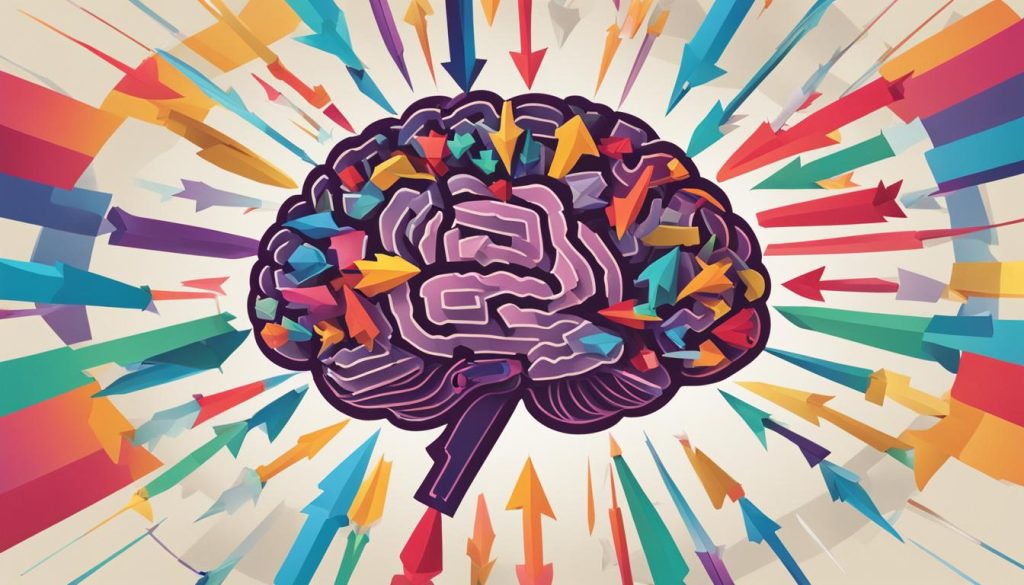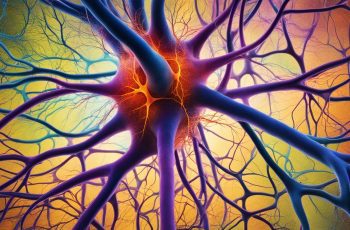Greetings! I’m here to share valuable information on how to reverse cognitive decline and prevent further deterioration. Mild cognitive impairment (MCI) is a common condition characterized by memory problems and cognitive difficulties. While it can be a precursor to dementia, there are steps you can take to regain cognitive function and protect your brain health.
The first crucial step is to obtain a proper diagnosis, which may involve physical exams, lab tests, and brain imaging. Once diagnosed, treatment options include medications, lifestyle changes, and addressing any underlying reversible causes of MCI. By taking proactive measures, you can actively combat cognitive decline and enhance your overall well-being.
Key Takeaways
- Proper diagnosis is essential for effectively addressing cognitive decline.
- Treatment options include medications, lifestyle changes, and addressing reversible causes of MCI.
- Regular physical exercise, a healthy diet, and brain-stimulating activities can improve cognitive function.
- Precision medicine offers personalized treatment approaches for cognitive decline.
- Understanding the role of Apolipoprotein E (APOE) can help identify potential therapeutic targets.
Diagnosis of Mild Cognitive Impairment
A diagnosis of Mild Cognitive Impairment (MCI) involves assessing memory or cognitive problems, observing a decline in mental function over time, and evaluating the absence of significant impairments in daily activities. Mental status testing plays a crucial role in the diagnostic process and can be conducted through short forms or comprehensive assessments, aiding in determining the severity and type of memory impairment.
Additionally, a neurological examination and lab tests are performed to exclude other medical conditions that may affect cognitive function. These tests, along with brain imaging, provide valuable insights into the underlying causes of MCI and help guide appropriate management strategies.
<!–
MCI Diagnosis: Key Factors
–><!–
There are several key factors involved in the diagnosis of MCI:
–><!–
- –><!–
- Presence of memory or cognitive problems
- Decline in mental function over time
- Absence of significant impairment in daily activities
- Results from mental status testing
–><!–
–><!–
–><!–
–><!–
–><!–
Memory Impairment Testing
–><!–
Memory impairment testing plays a significant role in evaluating the severity and type of memory impairment present in individuals with MCI. Short forms of testing, such as the Mini-Mental State Exam (MMSE), the Montreal Cognitive Assessment (MoCA), or more detailed assessments, like the Alzheimer’s Disease Assessment Scale-Cognitive Subscale (ADAS-Cog), may be utilized, depending on the specific needs of the patient.
–><!–
Neurological Exam
–><!–
A neurological examination is critical in the evaluation of individuals with suspected MCI. It allows healthcare professionals to assess various aspects of neurological function, including reflexes, coordination, sensation, and cognition. This comprehensive examination helps rule out other neurological conditions that may mimic or contribute to cognitive impairment.
–><!–
Lab Tests
–><!–
Lab tests are an integral part of the diagnostic process for MCI. These tests may include blood work to evaluate factors such as thyroid function, vitamin B12 levels, and metabolic markers. Additionally, other tests, like cerebrospinal fluid analysis, may be considered in certain cases to aid in diagnosing specific underlying causes of cognitive decline.
–><!–
Brain Imaging
–><!–
Brain imaging techniques, such as magnetic resonance imaging (MRI) or positron emission tomography (PET), can provide valuable information about the structure and function of the brain. These imaging modalities help identify any abnormal changes associated with MCI, rule out other brain pathologies, and guide treatment decisions.
–><!–
Summary
–><!–
The diagnosis of MCI involves a comprehensive evaluation, including memory impairment testing, a neurological exam, lab tests, and brain imaging. These assessments help determine the presence and severity of cognitive impairment, exclude other medical conditions, and guide appropriate management strategies.
–>
Treatment Options for Cognitive Decline
When it comes to addressing mild cognitive impairment (MCI), the focus is on treating reversible causes and effectively managing the associated symptoms. While there are Alzheimer’s drugs available, such as cholinesterase inhibitors, they are typically prescribed for individuals experiencing memory loss as the primary symptom, rather than as a routine treatment for MCI.
It is crucial to identify and address any underlying conditions or reversible causes contributing to MCI. Some reversible causes may include certain medications, high blood pressure, or depression. Treating these conditions appropriately can help in managing cognitive decline.
In addition to addressing reversible causes, lifestyle changes play a significant role in improving cognitive function. Regular physical exercise not only helps promote overall health but also supports brain health. Adopting a healthy diet that includes brain-healthy nutrients, engaging in brain-stimulating activities, and fostering social engagement are also recommended strategies for improving cognitive function.

By combining appropriate treatment for reversible causes, lifestyle modifications, and engaging in activities that support brain health, individuals with MCI can potentially slow down the progression of cognitive decline and enhance their overall quality of life.
Importance of Lifestyle Changes
Making certain lifestyle changes can play a significant role in reversing cognitive decline. Regular physical exercise has been shown to have positive effects on cognitive function and can help prevent further decline. Engaging in brain-stimulating activities, such as playing games or musical instruments, reading books, and socializing, can also help preserve brain function. A healthy diet that includes foods rich in omega-3 fatty acids, antioxidants, and other beneficial nutrients can support brain health. Additionally, managing stress levels, getting quality sleep, and avoiding smoking and excessive alcohol consumption are important for cognitive function.
Cognitive Decline Prevention Exercises
Exercise is not only beneficial for physical health but also for cognitive function. Regular exercise can improve blood flow to the brain and promote the growth of new neurons. It can also reduce the risk of chronic conditions, such as heart disease and diabetes, which are associated with cognitive decline.
Cognitive Decline Reversal Tips
In addition to exercise, there are several other strategies that can help reverse cognitive decline. These include:
- Engaging in mentally stimulating activities, such as puzzles, crosswords, and learning new skills
- Following a Mediterranean-style diet that is rich in fruits, vegetables, whole grains, fish, and olive oil
- Getting an adequate amount of sleep each night to support brain health
- Managing stress through techniques like meditation, deep breathing, and yoga
- Limiting alcohol consumption and avoiding smoking
By incorporating these lifestyle changes into your daily routine, you can take proactive steps to improve cognitive function and prevent further decline.
Reversing Cognitive Decline with Precision Medicine Approach
The precision medicine approach is revolutionizing the field of cognitive health by providing personalized treatments tailored to each individual’s unique genetic and biological makeup. By identifying and addressing the underlying causes of cognitive decline, such as nutrient deficiencies or toxic exposures, precision medicine offers targeted therapies that aim to reverse or slow down the progression of the condition.
One of the key advantages of precision medicine is its ability to target specific factors that contribute to cognitive decline. This personalized approach allows healthcare providers to develop customized treatment plans that address the individual’s unique needs and circumstances. The treatment plan may include a combination of lifestyle changes, nutritional interventions, detoxification protocols, and, if necessary, medication.
Personalized Treatment for Cognitive Decline Reversal
By utilizing precision medicine techniques, healthcare practitioners can identify the specific factors that are contributing to cognitive decline in each patient. This comprehensive evaluation helps create a tailored treatment plan for each individual, optimizing their chances of reversing cognitive decline and improving their cognitive function.
The personalized treatment approach may involve implementing specific lifestyle changes, such as incorporating a healthy diet, engaging in regular physical exercise, and practicing stress management techniques. Additionally, nutritional interventions can be tailored to address any nutrient deficiencies that may be impacting cognitive function.
Furthermore, precision medicine allows for the identification of detoxification protocols suited to the individual’s unique needs. These protocols can help eliminate any toxic exposures that may be contributing to cognitive decline.
In some cases, medication may be necessary to target specific factors related to cognitive decline. Precision medicine ensures that any prescribed medication is appropriate for the individual and takes into consideration their unique genetic profile and potential drug interactions.
By employing a precision medicine approach, healthcare providers can offer specialized treatments that maximize the potential for cognitive decline reversal, giving patients a renewed sense of hope and improved quality of life.
Role of Apolipoprotein E (APOE) in Alzheimer’s Disease
Apolipoprotein E (APOE) plays a crucial role in the metabolism of lipids in the brain. This protein is encoded by the APOE gene, which has different variants. Among these variants, APOE4 is widely recognized as a significant genetic risk factor for late-onset Alzheimer’s disease.
Carrying the APOE4 variant increases an individual’s susceptibility to developing Alzheimer’s disease and can lead to cognitive decline at an earlier age. Research has shown that individuals with the APOE4 variant have a higher risk of developing Alzheimer’s disease compared to those without this variant.
Understanding the role of APOE and its impact on cognitive function is crucial in identifying potential therapeutic targets for reversing cognitive decline. By studying this protein’s function and the mechanisms through which it influences brain health, researchers can develop interventions to attenuate the effects of APOE4 and potentially delay or prevent the onset of Alzheimer’s disease.
Potential Reversibility of Cognitive Decline
Research suggests that cognitive decline may be reversible, especially when targeted early and through a comprehensive approach. The concept of brain plasticity supports the idea that the brain has the ability to adapt and reorganize itself, even in the presence of cognitive decline.
By addressing reversible factors, such as nutritional deficiencies, hormonal imbalances, chronic inflammation, and oxidative stress, it is possible to slow down or reverse cognitive decline. These factors can be effectively managed through personalized treatment plans tailored to each individual’s unique needs.

A comprehensive approach to reversing cognitive decline also involves preventive measures. Adopting a healthy lifestyle, including regular exercise, a balanced diet, and stress management, plays a crucial role in maintaining brain health. Engaging in cognitive-stimulating activities, such as puzzles, learning new skills, and socializing, can further support brain function.
Furthermore, appropriate medical management is essential in identifying and addressing any underlying causes or medical conditions that may contribute to cognitive decline. By taking proactive steps to manage these factors, individuals can optimize their cognitive health and potentially slow down the progression of cognitive decline.
In conclusion, cognitive decline is not necessarily an irreversible process. With the understanding of brain plasticity and the implementation of comprehensive strategies targeting reversible factors, it is possible to reverse or slow down cognitive decline. By adopting preventive measures and taking a proactive approach to cognitive health, individuals can improve their overall well-being and maintain optimal brain function throughout their lives.
Integrative Approaches to Cognitive Health
To promote cognitive health and address the underlying causes of decline, integrative medicine combines conventional medical treatments with complementary and alternative therapies. This holistic approach recognizes the connection between the body and mind, aiming to optimize cognitive function by considering various aspects of health.
Nutrition plays a crucial role in cognitive health. A diet rich in brain-boosting nutrients, such as omega-3 fatty acids and antioxidants, can support brain function and reduce the risk of cognitive decline. Physical activity is another key component, as regular exercise improves blood flow to the brain and stimulates the growth of new neurons. Managing stress and emotional well-being through techniques like meditation and yoga can also positively influence cognitive health.
Integrative medicine utilizes alternative therapies to further enhance cognitive health. Acupuncture, an ancient Chinese practice, can help rebalance the body’s energy flow and improve cognitive functioning. Herbal medicine, with its natural compounds, may provide additional support for cognitive health. Mind-body practices like meditation and yoga promote relaxation, reduce stress, and improve cognitive abilities. Nutritional supplementation can also be considered to provide essential nutrients for brain health.
By combining conventional medical treatments with complementary and alternative therapies, integrative approaches empower individuals to take a holistic approach to their cognitive health. These therapies consider the interconnectedness of physical, mental, and emotional well-being, allowing for a more comprehensive and personalized approach to address cognitive decline.
Conclusion
Reversing cognitive decline is within reach for individuals seeking to optimize their cognitive health and slow down the progression of cognitive decline. By implementing a combination of lifestyle changes, personalized treatments, and targeted interventions, there is hope in regaining cognitive function.
Early diagnosis and comprehensive evaluation are essential in identifying the underlying causes of cognitive decline. By addressing reversible factors such as nutritional deficiencies, hormonal imbalances, chronic inflammation, and oxidative stress, individuals can take proactive steps towards reversing cognitive decline.
The key to success lies in adopting a holistic approach that encompasses various aspects of well-being, including diet, exercise, sleep, and stress management. Additionally, personalized treatment plans tailored to the individual’s unique needs and circumstances can further enhance the effectiveness of cognitive decline reversal strategies.
Remember, it is never too late to start making positive changes. By taking charge of your cognitive health and implementing the necessary lifestyle modifications and personalized treatments, you can empower yourself to reverse cognitive decline and improve overall cognitive function.
FAQ
How can I reverse cognitive decline?
To reverse cognitive decline, it is important to obtain a proper diagnosis and explore treatment options. Lifestyle changes such as regular exercise, brain-stimulating activities, and a healthy diet can also help improve cognitive function.
What is the diagnosis process for mild cognitive impairment (MCI)?
The diagnosis of MCI involves physical exams, lab tests, and brain imaging. Mental status testing is also conducted to assess memory and cognitive impairment. A neurological exam and lab tests may be performed to rule out other medical conditions.
What are the treatment options for cognitive decline?
Treatment options for cognitive decline include medications like cholinesterase inhibitors, lifestyle changes, and addressing any underlying reversible causes. Alzheimer’s drugs are prescribed for memory loss, while reversible causes such as underlying medical conditions or certain medications should be treated.
How can lifestyle changes help reverse cognitive decline?
Making lifestyle changes such as regular exercise, engaging in brain-stimulating activities, following a healthy diet, managing stress levels, getting quality sleep, and avoiding smoking and excessive alcohol consumption can play a significant role in reversing cognitive decline.
What is the precision medicine approach to cognitive decline?
The precision medicine approach aims to tailor treatment to the individual based on genetic and biological factors. Personalized treatments target specific factors contributing to cognitive decline, such as nutrient deficiencies or toxic exposures, and may include lifestyle changes, nutritional interventions, detoxification protocols, and medication if necessary.
What is the role of Apolipoprotein E (APOE) in cognitive decline?
APOE is a protein involved in brain lipid metabolism. The APOE4 variant of the APOE gene is a well-known genetic risk factor for late-onset Alzheimer’s disease and is associated with increased cognitive decline risk. Understanding the impact of APOE can help identify potential therapeutic targets for reversing cognitive decline.
Is cognitive decline reversible?
Research suggests that cognitive decline may be reversible, especially when targeted early and through a comprehensive approach. By addressing reversible factors like nutritional deficiencies, hormonal imbalances, chronic inflammation, and oxidative stress, it is possible to slow down or reverse cognitive decline. Prevention measures and a healthy lifestyle are also crucial for maintaining brain health.
What are integrative approaches to cognitive health?
Integrative approaches to cognitive health combine conventional medical treatments with complementary and alternative therapies. These approaches consider aspects such as nutrition, physical activity, stress management, and emotional well-being to address the underlying causes of cognitive decline. Examples include acupuncture, herbal medicine, mind-body practices, and nutritional supplementation.
How can I prevent and reverse cognitive decline?
Preventing and reversing cognitive decline involves early diagnosis, comprehensive evaluation, lifestyle changes, and personalized treatments. Positive changes to diet, exercise, sleep, and stress management, as well as addressing medical conditions or reversible factors, can optimize cognitive health and potentially slow down the progression of cognitive decline.




